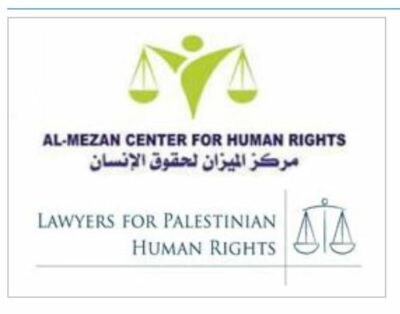Al Mezan Center for Human Rights is gravely concerned over reports of an ongoing surge in COVID-19 cases among Palestinian detainees in Israeli custody. Al Mezan reports that 85 Palestinians have tested positive in Gilboa Prison (HaShita Junction).[1] Despite numerous requests by Al Mezan to the Israeli Prison Service (IPS) to adequately mitigate and prevent the outbreak of the virus in its prisons, no measures have been taken to ensure that the health and hygiene needs of Palestinian detainees are met. Al Mezan is deeply concerned about the dire detention conditions that make Israeli prisons a dangerous breeding ground for the virus, notably due to overcrowded cells.
After Al Mezan’s follow-up, it was reported that on 2 November 2020 the IPS detected 11 new COVID-19 cases, prompting the authorities to test the detainees who had been in contact with the infected inmates. After having detected 54 new cases, the IPS closed Gilboa Prison. The total number of confirmed cases in Gilboa rose to 85 by Thursday morning.
Several human rights organizations, including Al Mezan, had warned of such severe repercussions of the prison conditions, in particular after the IPS released a statement regarding COVID-19 that portrayed a lack of protection measures. In a letter sent to the IPS on 10 March 2020, Al Mezan requested information and called for the implementation of appropriate preventive measures to address overcrowding, improve hygiene conditions, and regulate the interaction between prison personnel and inmates. On 24 March, the IPS replied with an evasive memo that failed to address the issues at hand.
The surge in COVID-19 cases among Palestinian detainees in Israeli custody highlights growing concerns over Israel’s adherence to the World Health Organization’s (WHO) guidelines. The Office of the High Commissioner for Human Rights and numerous United Nations human rights experts have also raised the issue of the need to protect the rights of persons deprived of liberty and prevent the spread of COVID-19 in detention settings.
In this regard, Al Mezan stresses that Israel, the Occupying Power, is bound by international human rights law and obligated to uphold the right of Palestinian detainees to the highest attainable standard of physical and mental health (Article 12 of the International Covenant on Economic, Social, and Cultural Rights) while, under international humanitarian law, persons deprived of their liberty must be provided with adequate medical attention.
Al Mezan also reiterates its call on the international community to take action to ensure that Israel upholds the rights of Palestinian prisoners and detainees by ending all discriminatory policies, by following WHO recommendations and guidelines, and by establishing protective measures against the outbreak of viral epidemics in its prisons.
[1] Located in the North of Palestine, Gilboa prison was established in 2004 next to Shatta prison in the Beesan (Beit She’an) area. The prison has five sections with 15 cells in each section. The prison is known for overcrowding cells with inmates being held eight per cell and given an insufficient number of beds.

